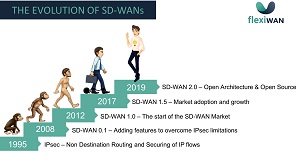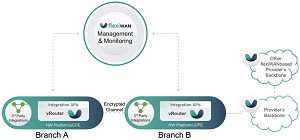News
Stealthy Start-Up Portends 'Second Wave of SD-WAN'
Israeli start-up flexiWAN has emerged from stealth with a software-defined wide-area networking (SD-WAN) offering that portends the "second wave of SD-WAN," marked by an open architecture in addition to open source software.
The open source SD-WAN software is now in beta, available for enterprise proof-of-concept (PoC) projects, with general availability expected late this year.
In entering the increasingly crowded SD-WAN arena, the company's catch is to free enterprises from proprietary systems and vendor lock-in, two of the main tenets of the transformative software-defined networking (SDN) movement to begin with.
But in flexiWAN's view, the current slate of SD-WAN products just isn't open enough, so it has added an "open architecture" tag to its open source software, which it said hearkens that second wave of SD-WAN that it delineates thusly:
 [Click on image for larger view.] Waves of SD-WAN (source: flexiWAN).
[Click on image for larger view.] Waves of SD-WAN (source: flexiWAN).
"While SD-WAN products use open source in their core, the products themselves are offered in the old fashion way of closed monolithic software," the company said. "Moreover, the architecture of these products is closed, making them a black-box overlay solutions. Offering SD-WAN open source is only one element in a broader strategy of flexiWAN for democratizing the SD-WAN market, dramatically lowering barriers to entry for companies to adopt it or offer services that are based on the flexiWAN SD-WAN Open Source. Above all, the flexiWAN SD-WAN Open Source makes enterprise networking vendor lock an episode of the past."
The open architecture approach is marked by integration points that enable enterprises to modify or replace core SD-WAN functionality and third-party logic, the company said in a white paper that illustrated the idea with this graphic:
 [Click on image for larger view.] flexiWAN Architecture (source: flexiWAN).
[Click on image for larger view.] flexiWAN Architecture (source: flexiWAN).
Examples of this third-party logic that can be easily integrated into the solution include:
- Best of breed technologies from independent vendors such as DPI, Security, WAN optimization, SBC, VoIP and other traffic specific optimization logic
- Application specific detection and optimization logic by SaaS application/service providers
- Enterprise specific traffic and network management requirements
- Integration into open source DevOps tools
The company's Web site has posted a form for interested enterprises to fill out for more information or to join in the beta PoC program. Reflecting the newness of the project, some parts of the site are unfinished, still containing placeholder content.
About the Author
David Ramel is an editor and writer at Converge 360.